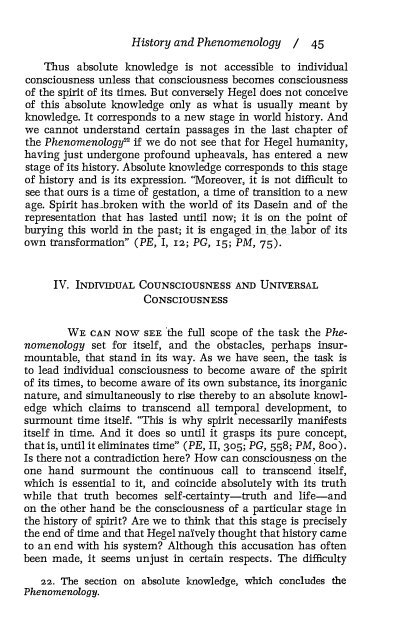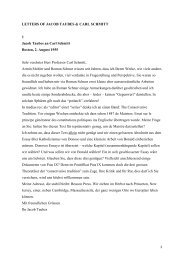selection one - Sound and Signifier
selection one - Sound and Signifier
selection one - Sound and Signifier
Create successful ePaper yourself
Turn your PDF publications into a flip-book with our unique Google optimized e-Paper software.
History <strong>and</strong> Phenomenology / 45<br />
Thus absolute knowledge is not accessible to individual<br />
consciousness unless that consciousness becomes consciousness<br />
of the spirit of its times. But conversely Hegel does not conceive<br />
of this absolute knowledge only as what is usually meant by<br />
knowledge. It corresponds to a new stage in world history. And<br />
we cannot underst<strong>and</strong> certain passages in the last chapter of<br />
the Phenomenologif2 if we do not see that for Hegel humanity,<br />
having just underg<strong>one</strong> profound upheavals, has entered a new<br />
stage of its history. Absolute knowledge corresponds to this stage<br />
of history <strong>and</strong> is its expression. "Moreover, it is not difficult to<br />
see that ours is a til-ne of gestation, a time of transition to a new<br />
age. Spirit has broken with the world of its Dasein <strong>and</strong> of the<br />
representation that has lasted until now; it is on the point of<br />
burying this world in the past; it is engaged in. the labor of its<br />
own transformation" (PE, I, 12; PG, 15; PM, 75).<br />
IV. INDIVIDUAL COUNSCIOUSNESS AND UNIVERSAL<br />
CONSCIOUSNESS<br />
WE CAN NOW SEE the full scope of the task the Phenomenology<br />
set for itself, <strong>and</strong> the obstacles, perhaps insurmountable,<br />
that st<strong>and</strong> in its way. As we have seen, the task is<br />
to lead individual consciousness to become aware of the spirit<br />
of its times, to become aware of its own substance, its inorganic<br />
nature, <strong>and</strong> simultaneously to rise thereby to an absolute knowledge<br />
which claims to transcend all temporal development, to<br />
surmount time itself. "This is why spirit necessarily manifests<br />
itself in time. And it does so until it grasps its pure concept,<br />
that is, until it eliminates time" (PE, II, 305; PG, 558; PM, 800).<br />
Is there not a contradiction here? How can consciousn.ess on the<br />
<strong>one</strong> h<strong>and</strong> surmount the continuous call to transcend itself,<br />
which is essential to it, <strong>and</strong> coincide absolutely with its truth<br />
while that truth becomes self-certainty-truth <strong>and</strong> life-<strong>and</strong><br />
on the· other h<strong>and</strong> be the consciousness of a particular stage in<br />
the history of spirit? Are we to think that this stage is precisely<br />
the end of time <strong>and</strong> that Hegel naively thought that history came<br />
to an end with his system? Although this accusation has often<br />
been made, it seems unjust in certain respects. The difficulty<br />
22. The section on absolute knowledge, which concludes the<br />
Phenomenology.




